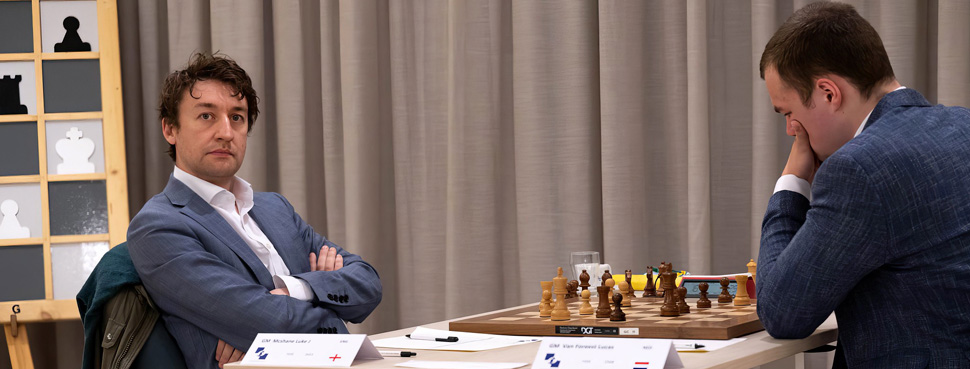Luke McShane was vandaag in de eerste ronde van de matches in het Hoogeveen Schaaktoernooi de enige die een vol punt boekte. In een variant die bekend staat als nogal saai, hield de Engelsman steeds een klein voordeeltje tegen Lucas van Foreest. Deze bezweek in de tijdnoodfase onder de druk door een fout te maken op zet 34, waarna een eindspel met vier torens snel gewonnen was voor McShane.
De eerste partij tussen Belgisch kampioen Daniel Dardha en Nederlands kampioen Max Warmerdam eindigde in remise. De Nederlander kreeg met zwart een voordeeltje, maar koos op zet 25 voor een afwikkeling die hem geen winstkansen meer gaf. Het idee waarmee hij voor de winst kan gaan was echter uiterst moeilijk te vinden als er geen computer-engine meeloopt.
In het Open toernooi waren er nauwelijks verrassingen te noteren. Alle favorieten wonnen, alleen Seth van der Vegt en de pas tienjarige Oscar Zecha behaalden eervolle remises tegen op papier veel sterkere spelers, respectievelijk Bhakti Kulkarni en Bram van den Berg.
Foto's door Frans Peeters: hier.
Het Engelstalige liveblog van Peter Boel:
We've started!
Loek van Wely just opened the Open Group which counts no less than 92 players at the moment. The GM/tournament director expressed gladness that so many players have come to Hoogeveen again. 'I can announce here that we have also arranged that the Hoogeveen Tournament will take place next year as well,' he said, gaining him a round of applause.
Today the tournament has a top commentator: GM Ivan Sokolov, the coach of the winning Olympiad team of Uzbekistan. Van Wely himself will do the commentary tomorrow.
After the usual instructions by chief arbiter Frans Peeters, the round started almost on time. After that, there was unfortunately no time for Van Wely to cross-examine the four match players in his usual sharp way. But we will probably get enough of that in the coming days!
Open openings
Both match games have started with 1.e4 e5. The game McShane-Van Foreest is a Berliner, which won't please the audience too much... but who knows the endgame (or maybe rather 'queenless middlegame') will bring us some surprises.

Dardha and Warmerdam are playing an Italian Game.

Too sharp?
Daniel Dardha is pushing on the queen's wing. Commentator Ivan Sokolov was not very enthusiastic about the young Belgian's idea in the following position:

Here Dardha played 13.b5 which by the way is Stockfish 15's first choice. Sokolov: 'But the knight is not good on c6; like in many Ruy Lopez variations it has to be moved. Now White is forcing the black knight to do what it wanted to do anyway.' It looks like Black is getting a nice initiative on the kingside. White's idea is probably 14.d4, but Dardha is waiting long with this.

Three pawns for Hovhannisyan
Robert Hovhannisyan, a productive member of the Armenian team that came second at this year's Olympiad, looks like he's going to start with a full point. The sharp Frisian player Jan Boersma sacrificed a pawn with Black, but during the course of the game it has become three, and this should be really too much.
Open results
Some of the nine highest boards in the Open, which are, by the way, being played on the first floor, have been decided quickly. You can't beat Evgeny Romanov, whose opponent Jan Lootsma arrived too late and got forfeited. SS Kumar, Luca Moroni's opponent, also arrived quitea bit too late, but the Italian GM proposed to share the lost time. As a consequence, he is now facing some tough resistance in a sharp position. GM Sipke Ernst and Thomas Beerdsen have also won. When Ernst won a pawn in the ending, Mark Bloem surrendered quickly. In a Najdorf in which Beerdsen opted for 6.h4, things were not so clear, but when Ten Ham blundered a piece it was immediately over.

An overview of the nine top boards of the Open
Miniatures for Mellema and Konings
Local player Andries Mellema also noted a quick win today, after Mick Godding's queenside collapsed. It was over on move 20.
Frans Konings took one more move against Bert Uneken, but his victory looked quite pretty.

13.Rxf5! exf5 14.Ng5 O-O What else? 15.Qh5 h6 16.Nxf7! Rxf7

17.Bxh6! gxh6 If, e.g., 17...Na6, White plays 18.Dg6 Kf8 (otherwise mate on g7) 19.Dh7 and wins. 18.Qg6+ Kf8 19.Qxh6+ Kg8 Of course not 19... Rg7 20.Qh8+. 20.Re1 Nd7 21.Re7 1-0
McShane grinds away
Luke McShane is known for his ability to draw out endings for a long time. There are many developments in the Berlin Variation, as Sokolov pointed out, but the Englishman opted for Kramnik's old main line. He was working with the threat e5-e6 for a while, and this push (with which Judit Polgar once won a great rapid game against Kasparov) came on move 21. However Lucas van Foreest is still keeping his position more or less intact for now.
Problems for Van Foreest
Lucas van Foreest looks to be losing in the tricky double-rook ending against Luke McShane. Probably things went wrong at the following moment:

Here, Lucas played 34...Rgg4?!, a move which does little at the moment. If he had played the other rook, 34...Rag4, probably the position would have been equal after e.g. 35.g3 h4! 36.gxh4 Rf4. Now, Luke is always one step ahead in the ending.
Sudden collapse Van Foreest after long pressure
Lucas van Foreest was glad he was still alive in the rook ending, but there he soon went wrong. He praised Luke McShane's play, keeping the pressure, and had been pessimistic for a large part of the game. 'I committed some inaccuracies, and Luke played a few moves I hadn't seen. Surprisingly I was still more or less OK. But I blundered 35.f3', the Dutchman said. Better would have been 34...Rag4, as said before, but McShane had planned 35.g3 h4 36.Re3 'when I still have something, I think'. The engines say Black is OK, but in a practical game, under constant pressure, things are quite different.
'Good luck tomorrow,' Lucas said to Luke when he left. That may promise some firework when Lucas has White...
Dardha looks on his way to a draw
It seems that Max Warmerdam has spoilt his advantage. Right after his nice combination, he probably went wrong:

Here, Warmerdam played the surprising and probably not so good 25...Nd4 which 'just draws', said Sokolov, after 26.Rxc7 Nxb5 27.Rxb7 Bxe3 28.Rxb5 and Black has nothing. Probably better was simply 25...dxe5, when after 26.Rxc7 Rf6! Black has a dangerous initiative, e.g. 27.Bxa7 (otherwise 27...Raf8) 28...Rxa7 28.b6 Ra2 29.Nc3 (29.Rxb7 Ng5! is painful!) 29...Ra3 and White can't take on b7 and still has some problems.
Sokolov suggested 25...Bxe3 26.fxe3 Ng5, but then White also seems to draw even with 27.Rxf8+ Rxf8 28.Nd2. If 26...Nxe5, Black still has something after 27.Rxf8+ Rxf8 28.Rxc7 Rf3+, but not very much.
Warmerdam has managed to win a pawn in the bishop vs rook ending, but with all the pawns on one side, and the bishop of the wrong colour, this looks like a draw. Probably Warmerdam just wants to torture his opponent a little longer.
Just two surprising draws
The first round in the Open shows a very regular list: all the favourite players won today. Only Seth van der Vegt held the strong Indian FM Bhakti Kulkarni to a draw with three pawns against a bishop. And Bram van den Berg kept trying but couldn't win a rook vs knight + 2 pawns ending against the youngest player in the field: almost 11-year-old Oscar Zecha. He is the youngest but also one of the most talented!
Dardha and Warmerdam draw
Yes indeed, the game has ended in a draw. Warmerdam hadn't seen how he could get something in the line with 25...dxe5 26.Rxc7 Rf6! 27.Bxa7. It was indeed hard to see -- 'those are pure computer lines,' Dardha commented. A good defensive performance by the Belgian, although he may have wanted to achieve more with White.

 .
. 






















